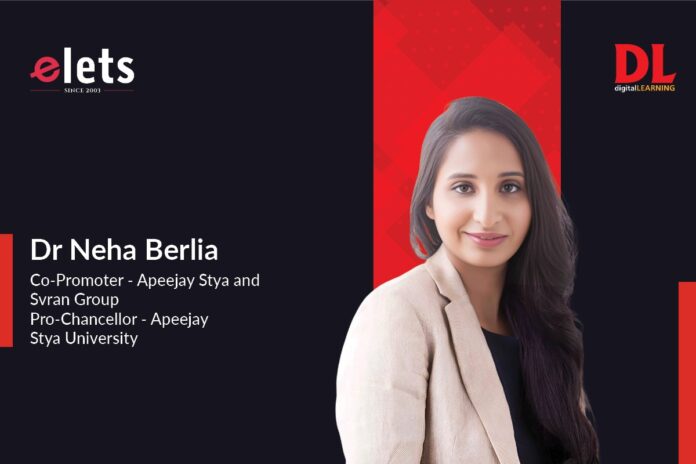
Indian academia stands at a promising yet challenging juncture in AI education. Over the past decade, AI courses and innovation hubs have expanded rapidly, but meaningful integration requires more than advanced labs or computing power, shared Dr. Neha Berlia, Co-Promoter, Apeejay Stya and Svran Group and Pro-Chancellor, Apeejay Stya University in an exclusive interaction with Elets News Network (ENN). Edited excerpts:
How do you envision the role of universities in shaping the workforce of 2047?
As India celebrates 100 years of independence in 2047, universities will be at the forefront of driving change. The future workforce will be shaped by rapid technological advancements, evolving socio-economic systems, and global collaboration.
Universities have a dual responsibility: to build strong foundational skills and to enhance adaptability. Digital literacy, data analysis, critical thinking, and ethical reasoning will be essential, while adaptability will ensure that graduates remain relevant in a constantly changing world.
At Apeejay Stya University (ASU), we are embedding this philosophy into our programs. Our interdisciplinary, multidisciplinary, and transdisciplinary courses allow engineering students to explore design, entrepreneurship, and philosophy. This broad exposure builds resilience—a critical trait for the workforce of the future.
Beyond education, universities must become knowledge creators by emphasising research, innovation, and incubation. By 2047, institutions that integrate industry collaboration, global exposure, and socially responsible research will enable India to lead in fields such as artificial intelligence, clean energy, healthcare innovation, and advanced manufacturing.
Since many of the jobs of 2047 do not yet exist, universities must nurture lifelong learning, supported by strong alumni networks and continuous upskilling opportunities.
Do you feel Indian academia is ready, in terms of faculty training and infrastructure, to teach and research AI meaningfully?
Indian academia stands at a promising yet challenging juncture in AI education. Over the past decade, AI courses and innovation hubs have expanded rapidly, but meaningful integration requires more than advanced labs or computing power.
The true strength of an AI-ready university lies in faculty expertise and adaptability. AI spans multiple disciplines, influencing medicine, law, design, humanities, and ethics. Faculty training must therefore evolve continuously, with an emphasis on skill development, industry collaboration, and interdisciplinary approaches.
At ASU, we invest heavily in faculty development programs, collaborate with global universities, and partner with industry leaders in AI and machine learning. Faculty regularly engage in workshops, research projects, and real-world applications to stay ahead of emerging trends.
The growing accessibility of AI tools has made skills more attainable, but the real challenge lies in effective integration. Students need to work on practical, hands-on projects rather than relying solely on theoretical models. With strategic investments and sustained collaboration, Indian academia can overcome current gaps and position itself as a global leader in AI innovation.
How can Indian universities ensure that graduates are not only literate but also competent for the global job market?
Global competence goes beyond academic knowledge; it combines skills with a forward-thinking mindset. Traditional rote learning no longer meets this need. To prepare students effectively, universities should focus on four key areas:
- Experiential Learning
Classroom education must be complemented with real-world exposure. At ASU, for example, students engage in live industry projects, internships, and entrepreneurial ventures that equip them with practical skills.
- Global Perspectives
Cultural awareness is crucial in today’s interconnected world. Short-term study abroad programs, virtual exchanges, and global industry collaborations help students understand international systems and markets.
- Communication and Collaboration
Employers value graduates who can thrive in diverse teams and adapt to multicultural environments. Strong communication, teamwork, and problem-solving abilities should be integral to every academic program.
- Research and Innovation
Universities must nurture curiosity and experimentation. Incubation centers and innovation labs can support students in transforming ideas into prototypes with expert guidance.
By producing digitally literate, emotionally intelligent, and culturally aware graduates, Indian universities can create a workforce that not only seeks jobs but also drives industries forward.
There’s concern that AI may replace jobs. From your perspective, how do you see this challenge evolving, and what opportunities might emerge as a result?
AI is often seen as a threat to jobs, but in reality, it enhances human potential. Like every industrial revolution, AI will replace certain roles while also creating new ones. The key lies in how effectively individuals use it.
AI will take over repetitive tasks, allowing people to focus on creativity, problem-solving, and strategic decision-making. It’s not AI that eliminates jobs, it’s people who fail to adapt to it. That’s why skill development is essential.
The future will not reward degrees alone but the ability to innovate, adapt, and apply AI across diverse fields. That’s why we must include AI skills in our programs, invest in strengthening faculty capabilities, and build research hubs that connect students with industry and policymakers.
Preparing for this transformation requires us to emphasise continuous skill development, integrate ethics and empathy into AI education, and foster entrepreneurial thinking to create future-ready solutions.
To students, educators, and professionals, my message is clear: AI will be part of our future. Make it your ally. Learn it, experiment with it, and combine technical expertise with human strengths—creativity, ethics, empathy, and leadership. Because in the India@100 workforce, it won’t be AI replacing you; it will be someone who knows how to use it better.
How can private universities collaborate with industry and policymakers to build a resilient, future-ready India@100 workforce?
Building a strong workforce for India@100 requires deep collaboration between academia, industry, and policymakers. The fast pace of technological change demands a seamless exchange of knowledge and skills.
Also Read: UNESCO calls for inclusive AI in education
Private universities, with their agility, are well-positioned to serve as hubs of innovation. Collaboration can take shape in the following ways:
- Curriculum Co-creation
Industry and universities should jointly design forward-looking curricula. For instance, at ASU, industry experts help shape programs to ensure students graduate with the skills most in demand.
- Research Partnerships
Industry-sponsored research can address urgent challenges while providing students with valuable real-world experience. Shared research centers can drive breakthroughs in areas such as AI, biotechnology, clean energy, and digital health.
- Policy Engagement
Universities must actively participate in policy discussions to ensure education aligns with global and technological shifts. Policymakers, in turn, should enable academia–industry partnerships through incentives and supportive frameworks.
- Internships and Apprenticeships
Well-structured work-integrated programs can bridge classroom learning with industry needs, creating a workforce that is both skilled and adaptable.
Ultimately, building a strong workforce is a shared responsibility. When academia, industry, and policymakers collaborate effectively, India will not only be prepared for the future but also positioned to lead globally by 2047.






















